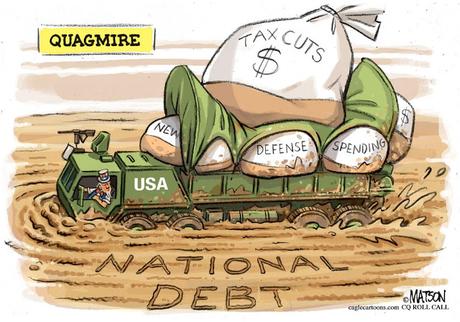 (Cartoon image is by R.J. Matson in Roll Call.)
(Cartoon image is by R.J. Matson in Roll Call.)During his campaign in 2016, Donald Trump bragged that he would completely eliminate the huge national debt in 8 years. And when he took office, he had Republican majorities in both houses of Congress (the party that has always bragged that it is the party of "fiscal responsibility"). Did they take any action to eliminate, or even lower, the national debt? NO!
In fact, they did just the opposite. They passed a big increase in the military budget and then passed a tax cut (which mostly benefitted the rich and corporations). These two actions have contributed to increasing the national debt by debt by $2 trillion in Trump's first two years -- and promise to increase that debt by another trillion dollars each year in the future.
This is not just a broken campaign promise. It is terrible economic policy -- and it must be reversed.
Here is how CNN describes the ballooning national debt:
The US national debt stood at $21.974 trillion at the end of 2018, more than $2 trillion higher than when President Donald Trump took office, according to numbers released Thursday by the Treasury Department. The national debt has been rising at an accelerated rate in the aftermath of the 2008 financial crisis, when Congress and the Obama administration approved stimulus funding in order to keep the economy afloat. The debt began to level off at the beginning of Trump's term, but bounced up again last year as the tax cuts passed at the end of 2017 took effect and the dramatically lower corporate tax rate lowered Treasury revenues. As a candidate, Trump promised to "get rid of" the national debt, telling the Washington Post in 2016 that he could make the US debt-free "over a period of eight years." According to the Congressional Budget Office, total public debt stood at 78% of America's gross domestic product in fiscal year 2018, the highest percentage since 1950. The deficit -- or the difference between what the government spends and what it takes in over any one year -- jumped to 3.8% of GDP in 2018, up from 3.5% in 2017. That's particularly unusual in such a strong economy without major new expenditures. If no changes are made, the CBO projects that public debt will rise to 96% of GDP by 2028. A big chunk of that -- $1.9 trillion between 2018 and 2028 -- will be due to the Tax Cuts and Jobs Act,the CBO reported last April.

